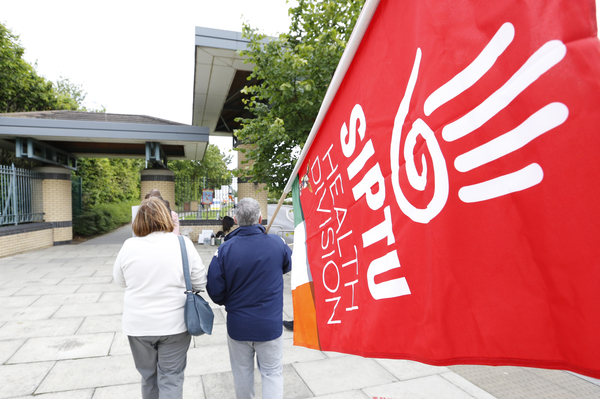Union representatives demand emergency meeting with Sisters of Charity management
SIPTU, Irish Nurses and Midwives Organisation (INMO) and Fórsa Trade Union representatives have today (Monday 10th August) written to Sisters of Charity management seeking an emergency meeting to discuss the payment of a fair redundancy package to staff in Caritas Convalescent Centre, St. Mary’s Centre Telford and St. Monica’s Nursing Home.
The call comes following second day of lunchtime protest outside St. Monica’s Nursing Home in Dublin today.
SIPTU Health Organiser, Brian Condra, said: “The loyal, dedicated staff in all three facilities owned by the Sisters of Charity, have provided years of outstanding service and have always put the patients first. In recent months, they faced the pandemic head on and continued to provide an optimum service to ensure patients were cared for, supported and made feel safe and secure at all times.
He added: “The Sisters of Charity must to do the right thing, considering the position our members now find themselves in, their years of dedicated service, precedent set in this area on redundancy payments and the most recent Labour Court Recommendation.
INMO Assistant Director of Industrial Relations, Lorraine Monaghan said: “The staff are devastated that they are now losing their jobs at a time of great uncertainty and are parting with their patients and colleagues. They are disappointed that the Sisters of Charity have not yet confirmed that they will play their part and put forward the necessary funds to ensure that staff receive the redundancy package that the Labour Court deems fair and reasonable.”
She added: “Union representatives are calling on the Sisters of Charity, to ensure the necessary funds will be released immediately to implement this recommendation in Caritas Convalescent Centre and that the Labour Court Recommendation will be applied in St. Mary’s Telford and St. Monica’s Nursing Home as the circumstances are the same in all three facilities.”
Fórsa Assistant General Secretary, Seán McElhinney, said: “Workers in all three facilities have provided the highest quality of care to their residents. While families and residents have expressed profound regret for the plight of the workforce, the Sisters of Charity have remained silent.
He added: “Worry and uncertainty are rife among the workforce. The Sisters of Charity can, and must, make it known that they intend to fund the recommendation of the Labour Court. The silence cannot continue.”






